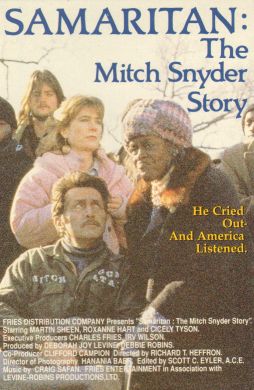
SAMARITAN: THE MITCH SNYDER STORY
US, 1986, 90 minutes, Colour.
Martin Sheen, Roxanne Hart, Joe Seneca, Stan Shaw, Cicely Tyson.
Directed by Richard T. Heffron.
Samaritan: The Mitch Snyder Story is based on a real character, a Vietnam veteran who returned and was concerned about the homeless in the U.S., especially in the city of Washington D.C. He is played with intense fervour by Martin Sheen at home with this kind of film and this kind of a cause - and the screenplay quotes from Fr. Daniel Berrigan S.J. about America and her homelessness (Berrigan being an idol of Sheen, working together with him in the documentary reconstruction of his trial, In the King of Prussia).
The film focuses well on its themes, dramatises the plight of the homeless, the shift in Western Society's in putting mentally disturbed people back in the streets rather than keep them in institutions, the manipulations of budget, the need for dramatic and symbolic actions such as protests, media stunts, farces to alert people to the inequalities between rich and poor. The supporting cast is strong, especially Cicely Tyson as a bag lady. The film was directed by Richard T. Heffron, a veteran of many telemovies and actions thrillers including Outlaw Blues, and Future World.
1. Significance of this kind of docudrama? A telemovie for the widest possible audience? Social themes presented in dramatic style? The aim of the film to rouse public interest, sympathy and help?
2. The Washington locations, the buildings, offices, the streets, the winter and the freezing streets of the city? The musical score?
3. The title, the focus on Mitch Snyder, the gospel parable references and the good samaritan?
4. The situations of poverty in Washington, overcrowding, rentals, buildings coming down for development, bureaucracy and their decisions? The homeless on the streets? The growing number? Need for shelter, food? People going out of institutions and onto the streets and not being able to cope for themselves? The deaths on the street? The bag ladies? The public and their concern - and the difficulties, even of dedicated workers to help the poor? The effect on the volunteers? The processes for alerting the public to the needs of the homeless?
5. Martin Sheen as Mitch Snyder, strength of character, Harry and Mitch pressurising the bureaucrats? Going to Ida Sinclair's house and helping her? His band of friends, their association, for peace, against poverty? How much selflessness - and how much ego (as he was accused)? His relationship with Carol and threatening it? The plan for the new building, the pleading? The decision to go on the streets with Harry? The advice from Muriel? Giving food to Jessie and Tom and their reaction, their
believing him, getting the schizophrenic reverend and giving him shelter? His prayers and their being fulfilled? The getting of the food from the supermarkets, the television interviews, the congressman and his challenge? Bob's market and Bob having to come to terms with the food on television? The lunch for congress members and alerting them to the problems? The pleading with officials including James Baker's wife? The promise for the building, the reaction of the police? Feeding the poor? Christmas? Loosing the building - and the decision to go on the hunger strike? Mitch and his physical collapse? The death of Jessie? Carol and her support? The change of heart - and Mitch's recovery, his interviews for the media, his plea for the cause?
6. Carol and her support, the emotional tension, helping Mitch? Harry and his help, the other helpers? The hard work?
7. The bureaucrats, the administration of properties, the reluctance to help with the poor? The plea to the churches to open for temporary shelter? The congressmen and their sympathies? James Baker's wife and her support? Meetings, phone calls, media interviews?
8. The role of the media, dramatising the stories, letting people know? Putting pressure on public figures to change their stances?
9. The portrait of the poor and homeless, Ida, her children, in hospital, literally carried out and evicted, furniture thrown out? Her hard work as a nurse? Volunteering to make the new centre comfortable? The young woman and her child? Jessie and the alcoholics in the park, clashes with Mitch? Supporting him, helping the homeless? Going through the freezing Washington night, Jessie's death?
10. Muriel, the bag lady and her past, helping Mitch, giving advise, selling the box and giving the change? Her continued help - and finally giving her testimony at the public enquiry, the jokes, people laughing and her rebuking them? Her vindication?
13. A portrait of the U.S. in the 80s, economic rationalism, government and the lack of concern for the poor? The intensity and obsession of one person and what it can achieve, gathering together the bureaucrats, the wealthy, the politicians - and Snyder's philosophy that if you treat people like people they will behave like people?